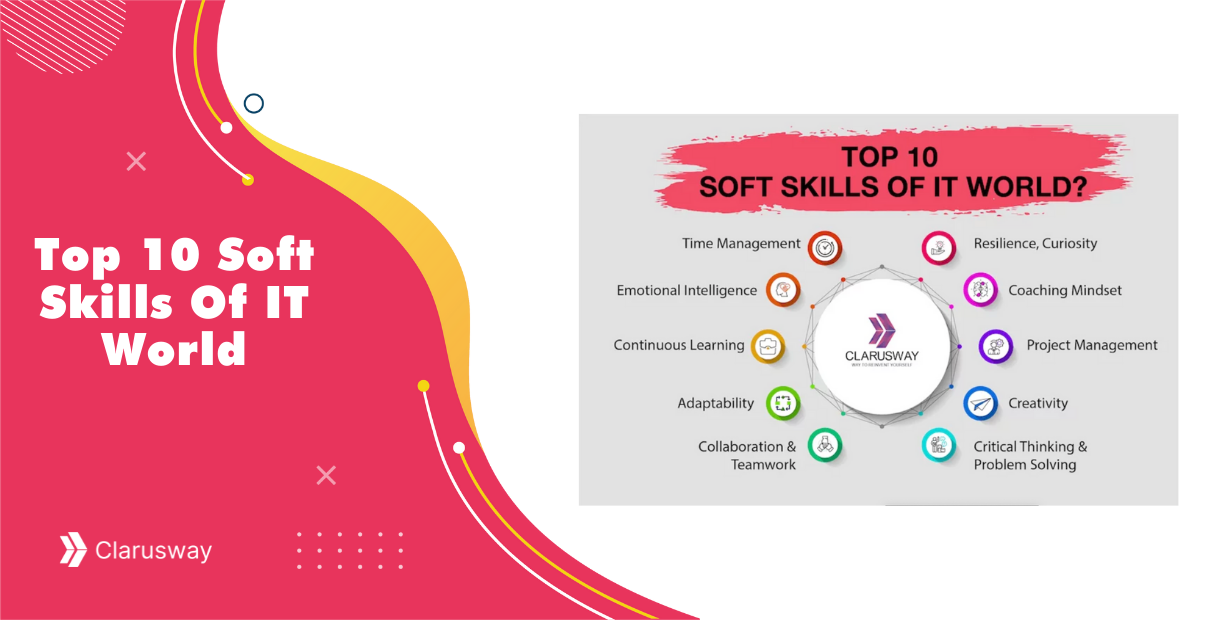In the ever-evolving landscape of software development, the fusion of operations and development—known as DevOps—has emerged as a pivotal approach to streamline and enhance the lifecycle of software development and deployment. As we step into 2025, the role of DevOps tools becomes increasingly significant, playing a critical role in automating, optimizing, and refining processes to achieve better efficiency, reliability, and performance in software delivery.
The concept of DevOps transcends beyond mere tools and technologies; it embodies a culture, a mindset focused on collaboration, continuous improvement, and a keen emphasis on automating all aspects of software creation, from initial design through integration, testing, deployment, and infrastructure management. This holistic approach not only accelerates the pace of development but also significantly improves the quality of the final product.
Our comprehensive guide, “Top 21 DevOps Tools Of 2025,” is meticulously curated to provide insights into the most influential and innovative tools reshaping the DevOps landscape this year. From continuous integration and delivery to configuration management and monitoring, these tools represent the forefront of technology aiding organizations in delivering high-quality software rapidly and efficiently.
Whether you are a seasoned DevOps professional, a software developer, or an IT manager, this guide serves as an indispensable resource, offering a detailed overview of each tool’s features, benefits, and potential impact on your DevOps journey. So, let’s dive in and explore the top DevOps tools that are setting the standard in 2025.

What Is DevOps?
DevOps is the mixture of practices, cultural approaches, and IT tools to automate the process of an organization to deliver IT products and applications more efficiently than traditional methods.
By implementing DevOps in the software development process, companies can increase the quality of their products, serve customers successfully, take feedback, and fix problems quickly.
Also, DevOps is a mindset that provides the opportunity to eliminate obstacles that exist in traditional development processes and operations that shortens the software development life cycle.
This method supplies the developer, DevOps engineer, and operation administrator team to work cooperatively and effectively while managing the entire software development lifecycle, from the development and testing phases to deployment and operations.

What is a DevOps Tool?
DevOps tool is a structure that provides automation of the software development process. It mainly deals with the stuff related to the software production process by implementing cooperation and collaboration among the development, testing, networking, administration, and operation departments.
What Are the Benefits of DevOps?
Companies implementing DevOps methods and tools work more efficiently, produce more frequently, and get the highest customer satisfaction to achieve business targets.
Furthermore, DevOps provides agile production opportunities by creating a productive environment with high cooperation and collaboration between organizations.
Let’s make it more obvious by looking into some important DevOps tools.
DevOps Automation Tools
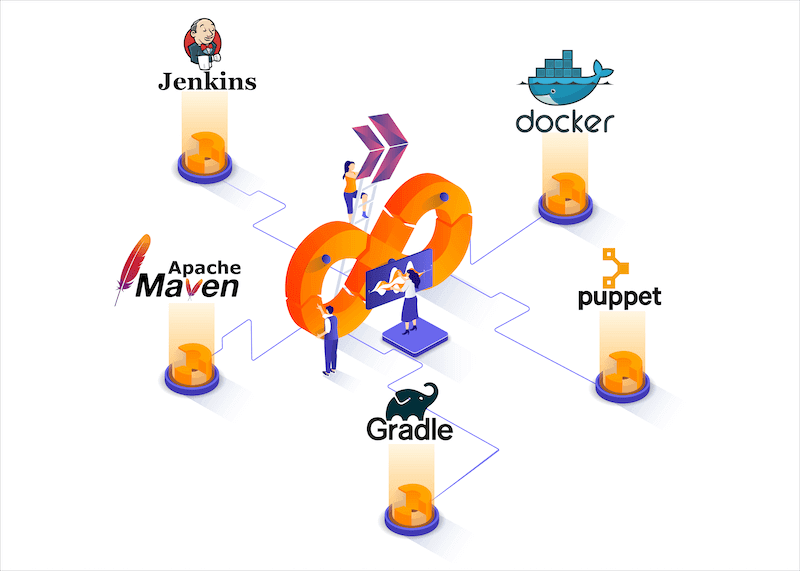
1. Jenkins
Jenkins is an open-source and proprietary tool. Jenkins is useful for automating software development tasks. For example, the build, deploy, and test process can be integrated with the help of this useful CI/CD tool.
Features of Jenkins:
- Jenkins can be used with more than 100 plugins to integrate with tools that are available in the CI/CD concept.
- It’s built with Java programming language. It can be installed and can be used in all of environments. The tool is convenient with Windows, macOS, and Linux operating systems.
- Jenkins has expandable architecture.
- Jenkins can be applied as a CI/CD tool for most software development projects.
2. Docker
Docker is beneficial for the purposes of building, packaging, running, and deploying apps easily and effectively on containers with necessary dependencies. Moreover, you can get rid of virtual machine inefficiency problems by using container structure.
Docker also provides the same software development environment that could be used on all of the stages in the DevOps pipeline, from development to staging and production. The most useful feature of Docker is that it provides an opportunity to developers to create Docker images that they can run on the development environment and for operation teams to run the same app in testing and deployment environments, all of which can be efficiently managed and orchestrated using Docker Compose.
Features of Docker:
- Docker is container-based technology, and containers are just to use the space of the operating system. Basically, a container is running a processor operating application at the moment that we run the prewritten images on the system. It is built for running applications. Docker containers use the same host machine OS resources.
- It can be run in different cloud vendors such as Azure, GCP, and AWS.
- The tool is designed to be open to renewal and development. It could always be updated and upgraded.
- Docker architecture has a platform-agnostic structure. It could be run on all operating systems.
3. Puppet
Puppet is another open-source and proprietary tool for software configuration management. Puppet can configure systems, deploy software, and orchestrate more advanced IT tasks such as continuous deployments, provisioning of IT infrastructure, patching, and configuration of software components and OS across cloud infrastructures and data centers.
Features of Puppet:
- Puppet is platform agnostic and compatible with all platforms such as Ruby, Microsoft Windows, Linux, and macOS X.
- It uses manifest files to define the desired configuration.
- If you would like to make small or big changes to your many numbers of systems, Puppet can do that with little effort and cost.
4. Apache Maven
Maven is a build automation tool used especially for Java projects. It’s used for building and managing any Java project. Additionally, Maven provides support in project workflows such as release and issue management.
It is not just useful for Java projects; you can use Maven to build and manage projects such as those written in Ruby, C#, and Scala.
Features of Maven:
- Maven makes the build process easy.
- Maven provides a uniform build system.
- Providing quality project information.
5. Gradle
Gradle is a useful open-source build and project management tool. The tool has the capability of building multi-language software development. In addition, it can complete the tasks of compilation packaging, testing, deployment, and publishing.
Features of Gradle:
- Gradle has high performance because you can avoid unnecessary work by running the tasks you need.
- You can extend Gradle to provide your own task types or even build the model.
- Several major IDEs allow you to import Gradle builds and interact with them.
DevOps (CI/CD) Tools
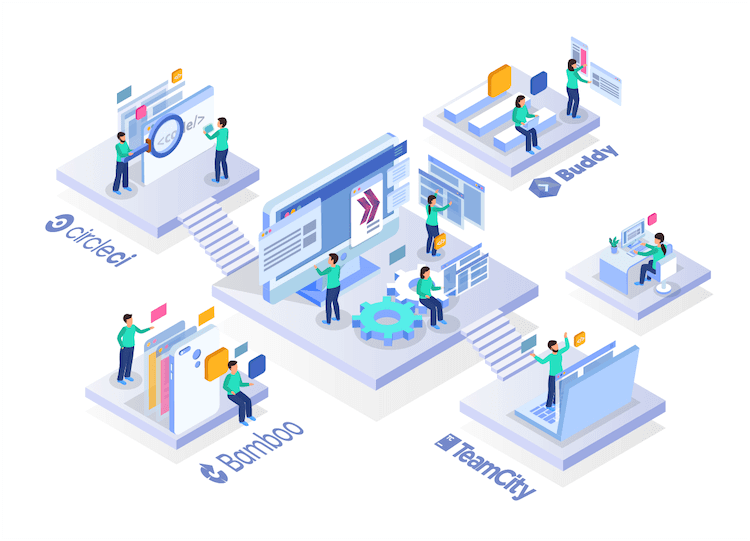
6. CircleCI
CircleCI is a popular DevOps tool for CI/CD purposes. Dev teams can build and release software as a product effectively and quickly by using this tool. In addition, you can create and release your code on any on-premise or cloud-based environment fastly and effectively.
Features of CircleCI:
- It has automated workflows on top of it and integration with third-party apps such as slack.
- It is easy to use and learn.
- It runs on Windows, macOS, Linux and supports Docker.
- Widely accepted such large community support available.
- You don’t need to resolve dependencies, unlike other similar platforms.
- Debugging is easy. Quick setup is available. It supports you to monitor outputs with a high-quality dashboard.
7. Bamboo
Bamboo is a continuous integration and continuous deployment server Atlassian is the founder of this DevOps tool. Bamboo provides automated builds, tests, and releases together in a single workflow by integrating with other Atlassian products such as JIRA, Bitbucket, Stash, Hipchat, and Confluence.
Features of Bamboo:
- Easy migration from Jenkins to Bamboo
- Provides parallel execution.
- Easy setup and configuration opportunity.
- Integrated architecture with Jira, Bitbucket servers, and Git branching.
8. TeamCity
TeamCity is a popular build management and CI tool developed by JetBrains. It is a powerful continuous integration tool for DevOps engineers. DevOps engineers, managers, and administrators in the DevOps area can use TeamCity effectively to build, deploy, and test applications in different cloud-vendors and different environments.
In addition, TeamCity is written in Java and is suitable for both free and proprietary use cases. The free version is used with the limitation of 3 build agents and 100 configurations.
Features and TeamCity:
- TeamCity is a proprietary tool.
- TeamCity interface is user-friendly. You can tag comments and pins to organize them easily. It is useful for reporting fast issue resolutions.
- It supports multiple platforms such as Java, Ruby, .NET, etc.
9. Travis CI
Travis CI is a continuous integration service useful for building and testing projects located in GitHub or Bitbucket repositories. Travis CI can detect a commit that exists in the repository. Travis CI always manages the build and run test process of the projects in an orderly manner. It is written in the Ruby programming language.
Features and Travis CI:
- It is convenient for Android, C, C#, C++, Java, JavaScript, etc.
- It supports automatic deployments in multiple cloud services.
- Has parallel testing capability.
- You can create a new VM after every build operation.
- It has pre-installed build and test tools.
10. Buddy
Buddy is a CI/CD tool that streamlines automation and delivery with a simple and intuitive UI. In addition, buddy provides an opportunity for the DevOps engineer to detect which frameworks or libraries exist in their code and recommend some useful kind of pipelines applicable to the projects.
Features and Travis Buddy:
- It supports many programming languages such as Ruby, Elixir, Angular, and Python.
- DevOps engineers can use the Buddy DevOps tool to build customized applications using features such as Docker layer caching, and concurrent pipelines.
- It has pre-installed build and test tools.
- It is adaptable with cloud vendors such as Amazon Web Services, Google Cloud, DigitalOcean, Rackspace, Heroku, and Azure App Service.
DevOps Version Control Tools
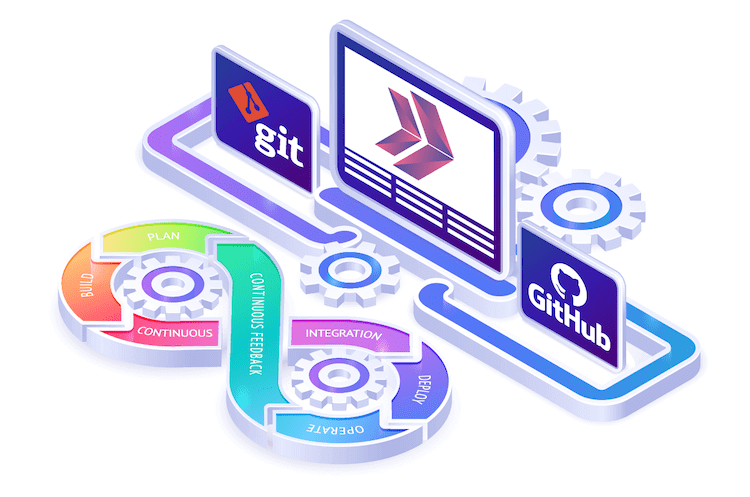
11. Git
Git is one of the most popular DevOps tools, and it is a free and open-source version control system that is used to deal with everything from different ranges of projects fast and effectively.
This distributed source code management (SCM) tool is useful for tracking the changes in source codes and files for implementing highly qualified software development processes. Its main purpose is to provide a fast, efficient, and distributed workflow.
Features and Git:
- It has Distributed System advantages.
- Compatible with other Operating Systems.
- Git provides work on a line that runs parallel to the main project files.
- It is easy to learn. You can get your expertise level high in a short time.
12. GitHub
GitHub is a repository for the versioning of source code that uses Git. It is useful to control software by allowing developers to make separate changes to files simultaneously. In addition to providing collaboration, GitHub supplies teams to work together to build and update their files and contents.
Thousands of companies and developers use GitHub to build, manage, and release their software. That is the most popular and powerful development repository. Additionally, you can use the web-hosting feature.
Features of GitHub :
- Compatible with most of operating systems.
- It is distributed and allows users to be at the same pace.
- Git empowers users to work on different branches and ultimately merge opportunities.
DevOps Configuration Management Tools
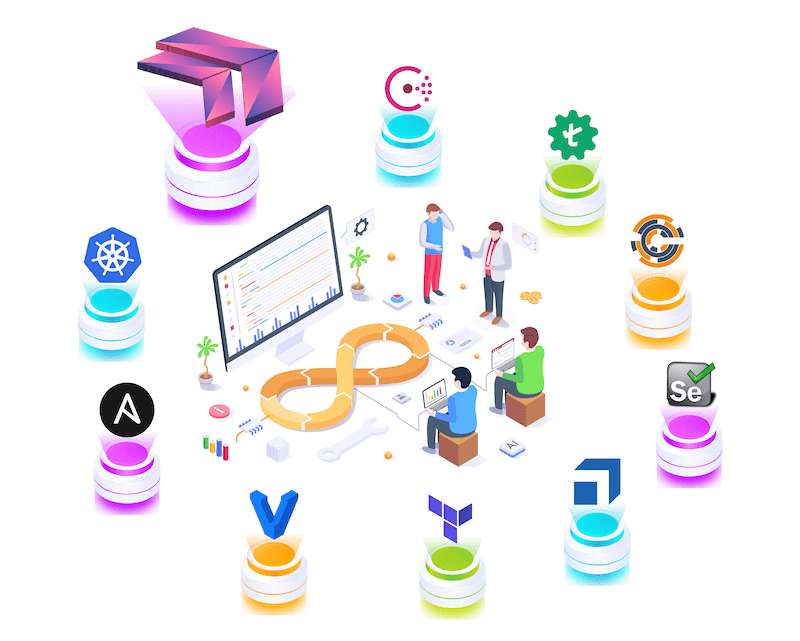
13. Chef
Chef is a configuration management tool and useful for automating configuration tasks in provisioned infrastructures. It has the capability to configure resources parallelly and allows managers to monitor the state of infrastructures. DevOps engineers define configurations in reusable manifests once and then apply management tasks across the Linux, Mac, and Windows operating systems.
Features of Chef:
- Chef uses Ruby language for configuration. Since the language has a simple syntax structure, it can be easily applicable to the management process by DevOps engineers who don’t have enough experience with the tool.
- It is the best DevOps tool to work with hybrid and multi-cloud infrastructure. Chef is compatible with all of the cloud structures.
- It is suitable for platforms that consist of Windows, macOS, Ubuntu, Solaris, etc.
14. Kubernetes
Kubernetes is a transportable open-source tool for managing and orchestrating containerized applications and services. It has two different approaches, which are imperative and declarative. Additionally, it has an extensive and always-growing community. As a result, Kubernetes tools and services are highly available and reliable.
Kubernetes’s name comes from the Greek language. It means helmsman or pilot. K8s is an abbreviation that is made up of counting the eight letters between the “K” and the “s”. Google started this project and delivered it as an open-source DevOps tool project to Cloud Native Computing Foundation in 2014.
Features of Kubernetes:
- Service discovery and load balancing can be made automatically.
- You can orchestrate storage with the help of volume objects.
- Kubernetes has the capability of automated rollouts and rollbacks.
- It can assign IPv6 & IPv4 addresses to services and Pods.
- Automatic bin packing could be done with K8s automatically.
- Self-healing is pretty useful for preventing failover scenarios.
- Secret and configuration management is an important feature for security reasons.
15. Ansible
Ansible is an open-source configuration management DevOps tool for IT tasks. In addition, the tool provides powerful automation solutions for DevOps engineers, Linux administrators, and IT operators from different domains. Finally, it’s a popular enterprise automation solution from Red Hat Community and the preferable IT automation technology.
Features of Ansible:
- It has simple architecture and syntax structure to automate IT tasks.
- No need for an agent to do actual work.
- Ansible is powerful for app deployment, configuration management, and workflow orchestration.
- It gets more efficient and secure.
- It uses an open SSH connection to configure servers.
16. Vagrant
Vagrant is developed by HashiCorp. It provides an effective workflow for IT tasks. Also, Vagrant is created by using the Ruby programming language and was released in 2010. It is an open-source DevOps tool useful for creating virtual infrastructures. Moreover, it has a simple structure and provides an opportunity to focus on automation. Lastly, Vagrant prevents wastage of time for the setup process, and increases the efficiency of production.
Features of Vagrant:
- Windows, macOS, Linux, FreeBSD, CentOS, and Debian operating systems can be used with Vagrant.
- It is easy to set up Multi-VM Networks with Vagrant.
- You can use Vagrant in integration with other configuration management tools such as Ansible, Puppet, Chef, and Salt.
17. Consul
Consul provides automation of network configurations. As a result, you can securely make connections and discover services in the cloud. This tool is very useful for DevOps environment architectures.
It gets extra benefits such as failover scenario handling, retries, and network observability. All of those features can be used separately if you need them. Furthermore, you can use them to create a full-service mesh.
Features of Consul:
- You can extend its functionality by integrity Consul with Kubernetes.
- It adds security to your services by providing mTLS encryption and with user policy-based architecture.
- It can scale and deploy new services and offer more reliability to prevent downtimes.
- You can integrate Consul with Kubernetes and use it more efficiently for microservices.
18. Terraform
Terraform is an open-source infrastructure as a code (IaC) DevOps tool. It allows you to provision, update, and change versions of sources securely and efficiently. Also, Terraform can be integrated with most of the cloud and service providers.
Features of Terraform:
- You may have several different clouds and platforms to support your various applications in a modern data center.
- With Terraform, you can manage a heterogeneous environment with the same workflow by creating a configuration file to fit the needs of your project or organization.
- The workflow built into Terraform aims to instill confidence in users by promoting easily repeatable operations.
19. Selenium
Selenium is one of the most popular open-source Web UI (User Interface) automation testing tools. Jason Huggins developed it in 2004 as a test automation tool. Selenium provides test automation across different browsers, environments, and programming languages.
Selenium also supports various programming languages such as C#, Java, Perl, PHP, Python, and Ruby. Selenium is most popular with Java and C# nowadays. Browsers that can be used with Selenium contain Internet Explorer, Mozilla Firefox, Google Chrome, and Safari.
Features of Selenium:
- Selenium is an open-source and practical Web testing tool.
- Selenium can be used with integration with project management and build tools such as Maven.
- You don’t need to allocate too many resources to run Selenium jobs.
- Selenium command structure syntax is easy to understand and implement.
20. Tricentis Tosca
Tricentis Tosca is a continuous testing framework that meets all of the requirements of the companies which are implementing Agile methodology in the development process. In addition, Tricentis Tosca supports test teams almost 90% test automation rate and achieves the fast and continuous feedback required for the DevOps department.
Features of Tricentis Tosca:
- Continuous and fast feedback for the DevOps department.
- Decrease regression testing time to minutes.
- Maximum reusability and maintainability.
- Early bug detection for preventing business risks.
21. TestSigma
TestSigma is a unified test automation tool developed for DevOps teams. Testsigma supports all teams to automate testing for web, mobile web, android, and iOS apps efficiently. No coding experience and skills are necessary. That is a cloud-based test tool powered by IA.
Features of TestSigma:
- Testsigma uses AI to build stable and reliable tests.
- No tools and programming experience is required to build and run automated tests.
- Generates a standard report with the information relevant to your team.
Conclusion
In summary, DevOps tools highlight a dynamic and evolving toolkit essential for modern software development. These tools, each with its unique strengths, collectively enhance automation, collaboration, and efficiency across the DevOps pipeline. For any organization or professional in the field, embracing these tools is critical for maintaining a competitive edge and ensuring the delivery of high-quality, robust software solutions in a fast-paced technological landscape. Ultimately, this comprehensive guide serves as a valuable asset for every DevOps engineer looking to excel in their role.

